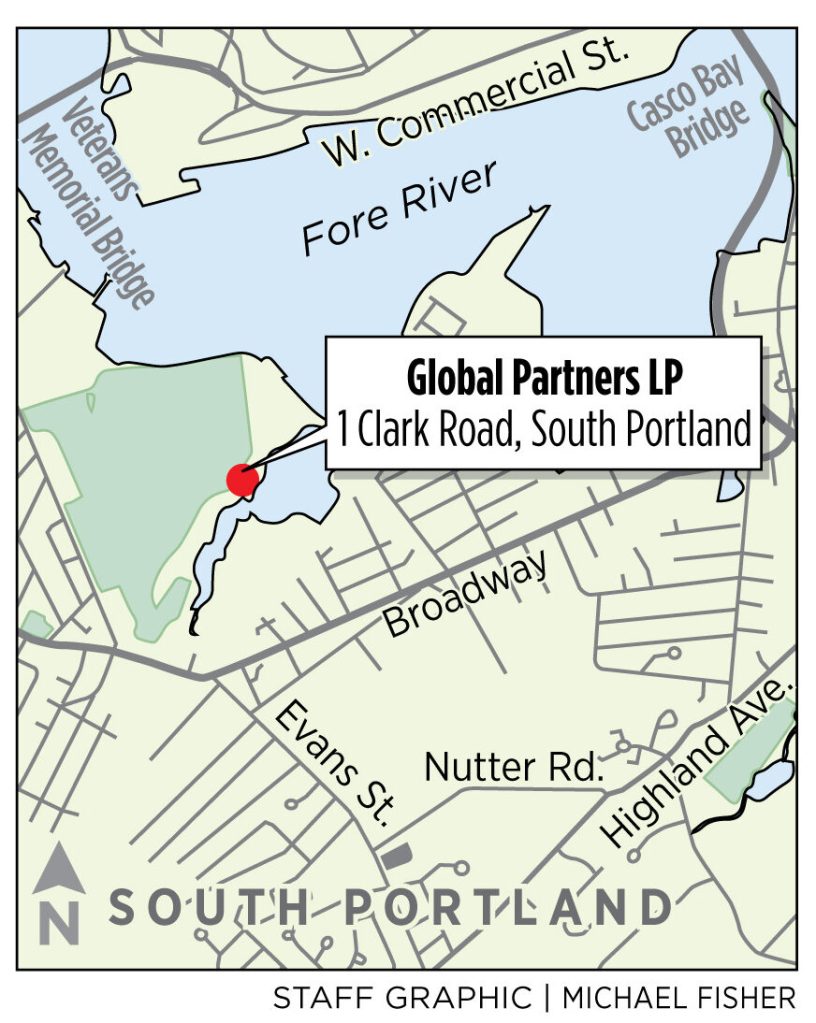SOUTH PORTLAND — Global Partners LP has agreed to pay fines and upgrade its petroleum storage facility on the Fore River after being charged with violating the Clean Air Act for more than a decade, the federal Environmental Protection Agency announced Monday.
Based in Waltham, Massachusetts, Global stores asphalt and No. 6 heavy fuel oil at its facility off Lincoln Street, at the end of Clark Road, near the Forest City Cemetery and the Pleasantdale neighborhood.
The Global facility receives asphalt and heavy oil by barge or truck and stores them in several massive tanks until they are loaded into tank trucks or marine vessels for distribution, according to a complaint filed Monday in U.S. District Court in Portland.
The tanks, which are heated to keep the asphalt and heavy oil fluid, were tested in 2016 and found to emit hazardous volatile organic compounds “at substantially higher levels than previously estimated,” the EPA said in a news release.
Potential VOC emissions were found to be greater than 50 tons per year – more than double the 21.9 tons per year allowed under an emissions license issued by the Maine Department of Environmental Protection in 2013, the complaint says.
VOCs produce a variety of short- and long-term health and environmental problems. The EPA didn’t identify which VOCs were emitted or quantify the hazard posed by the Global facility.
Because Global has operated the facility since 2002, the company is liable to pay civil penalties ranging from $32,500 per day for each violation after March 15, 2004, to $97,229 per day for each violation after Nov. 2, 2015, the complaint says.
Under a proposed settlement with the EPA and the U.S. Department of Justice, Global must apply for a revised license from the Maine DEP and take steps to reduce VOC emissions at the facility. The settlement, also filed Monday at the Portland courthouse, is a consent decree that is subject to a 30-day public comment period and final court approval.
The revised license will limit the amount of asphalt and heavy oil that can pass through the facility, the number of days that the storage tanks can be heated, and the total amount of heavy oil that can be stored at the facility. Global also must install mist eliminator systems on the tanks to address local air impacts.
In addition, the company must pay a $40,000 fine and invest at least $150,000 in a program to replace or upgrade wood stoves in the community. The program will provide vouchers to help people replace or retrofit older wood-burning stoves with cleaner-burning, more efficient heating equipment.
Global issued this written statement Monday: “As indicated, we have reached an agreement to reduce emissions at our South Portland Maine facility and invest in education around replacing wood stoves. We look forward to continuing to work with the community and government agencies.”
South Portland officials have taken steps in recent years to address concerns about the health and environmental impacts of more than 100 large storage tanks that serve seven fuel terminals on the city’s waterfront.
In 2014, the City Council passed the so-called Clear Skies ordinance, which effectively blocked the Portland Pipe Line Corp. from reversing the flow of its 236-mile South Portland-to-Montreal pipeline, largely because of potential air-quality impacts. The company has challenged the ordinance in federal court.
VOCs include a variety of chemicals that may produce adverse health effects such as eye, nose, and throat irritation, headaches, nausea, and damage to the liver, kidneys and central nervous system, the EPA said in the release.
VOCs also contribute to the formation of ground-level ozone. Breathing ozone can trigger a variety of health problems, particularly for children, seniors elderly and anyone with lung diseases such as asthma. Ground-level ozone also can harm sensitive vegetation and ecosystemss.
Send questions/comments to the editors.




Comments are no longer available on this story